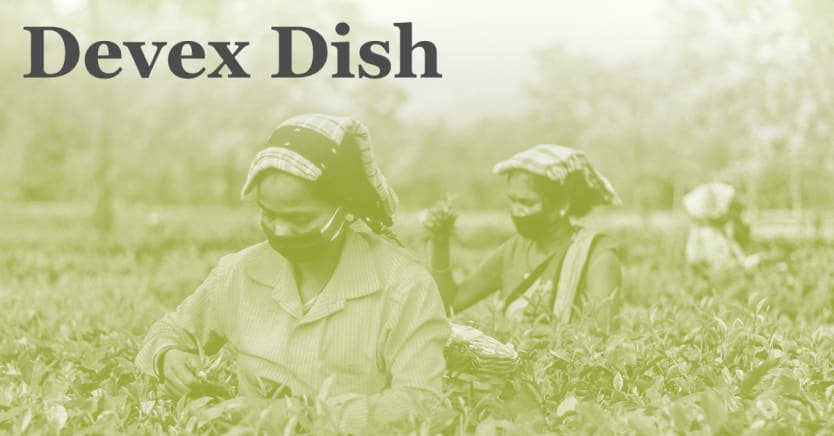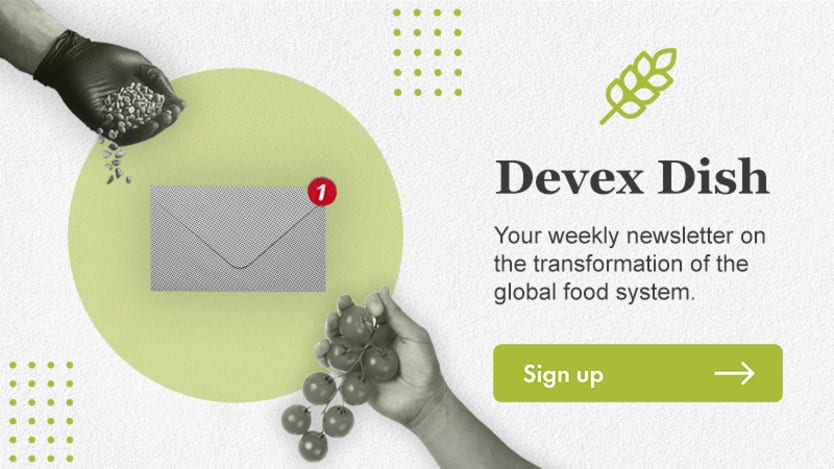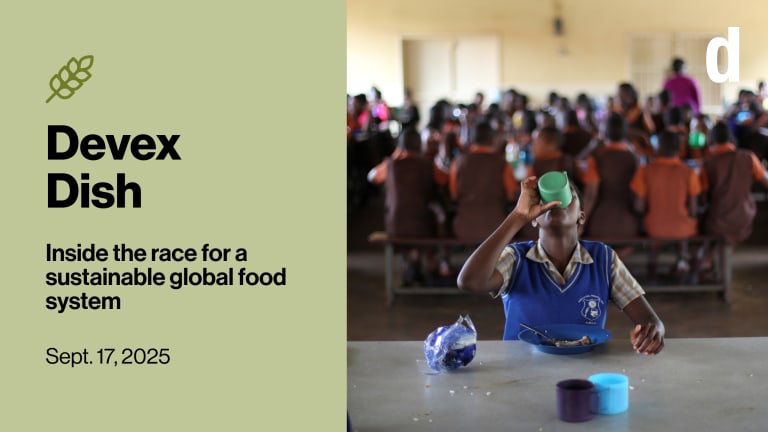
It’s been just a week since Russia’s unprovoked attack on Ukraine, and the humanitarian cost is mounting disturbingly quickly. Over half a million refugees have fled to neighboring countries, and WFP has launched emergency operations to provide food to people.
But the war will also affect hungry people in conflict zones in other parts of the world: Russia and Ukraine are major exporters of many important commodities such as wheat, barley, and sunflower oil. Over 50% of the cereals in North Africa and the Middle East are imported from Russia and Ukraine. This comes at a time when WFP is already forced to reduce rations for 8 million people in Yemen.
“It certainly will complicate operations by organizations like the World Food Programme that [have] to meet humanitarian needs. They have to purchase grain on the open market. They often — for wheat at least — often went to [the] Black Sea for supplies,” Joe Glauber, senior research fellow in the Markets Trade and Institutions Division at IFPRI, tells me. “That’s all complicated now, particularly the fact that prices are so much higher, so it’s going to require more funds to meet those needs.”
While the geopolitical implications of the Russian invasion are large given the potential impact on global food security, I’ve been thinking about how we cover Ukraine versus other refugee and food crises. We’ve been talking about this in the Devex newsroom — whether it’s Syria, Yemen, or Ethiopia. I’ve also had discussions with people outside the media who are realizing the wall-to-wall coverage we’re seeing is not afforded to wars outside Europe, and there are many conflicts happening around the world to which they’ve never given a passing thought.
This is a preview of Devex Dish
Sign up to this newsletter to get the inside track on how agriculture, nutrition, sustainability, and more are intersecting to remake the global food system in this weekly newsletter.
I’d love to hear from you about what type of coverage of the Ukraine crisis you’d like to see from Devex Dish. We know you’re consuming mainstream media, but what are they leaving out when it comes to the food security implications of the war? Write to me with your thoughts.
It only gets worse from here
The latest Intergovernmental Panel on Climate Change report was released Monday, but it didn’t get the usual news coverage amid the crisis in Ukraine. In case you missed it: While the report was hardly expected to be anything but grim reading, it certainly delivered on that point.
The IPCC report found that there will be an “increasing adverse impact” on agriculture and crop production in Africa, Australasia, Central and South America, and small islands. Asia, North America, Europe, and the Arctic will see some positive impacts along with the negative.
In the medium to long term, climate change will:
• Put more pressure on “food production and access, especially in vulnerable regions, undermining food security and nutrition.”
• Heighten the “frequency, intensity and severity of droughts, floods and heatwaves.” Along with “continued sea level rise,” this “will increase risks to food security … in vulnerable regions from moderate to high between 1.5°C and 2°C global warming level.”
• Make food security risks more severe, with a “2°C or higher global warming level … leading to malnutrition and micro-nutrient deficiencies, concentrated in Sub-Saharan Africa, South Asia, Central and South America and Small Islands.”
• Weaken “soil health and ecosystem services such as pollination, increase pressure from pests and diseases, and reduce marine animal biomass, undermining food productivity in many regions on land and in the ocean.”
Bean there done that
Nestlé has big ambitions for sustainability and traceability in its supply chain: A new initiative called the “income accelerator program” will pay farmers conditional cash transfers in exchange for meeting a series of conditions such as pruning, planting shade trees, and diversifying incomes by planting other crops or raising livestock. It also aims to address child labor by paying families for keeping children in school and out of the cocoa field.
Cocoa watchers tell me the plan looks great on paper, particularly the element of gender parity that sees the transfers split between a farmer and spouse to ensure women also have access to cash. But one thing it doesn’t do? Increase the price Nestle is paying for its cocoa.
“They cannot be a substitute for some of the other things that companies need to do, like paying their farmers a fair price,” Antonie Fountain, managing director of the Voice of Organizations in Cocoa, told me. “It’s both/and, it’s not either/or.”
Improving the supply chain: Nestlé cash transfer scheme could boost farmer income, but will it
Report card
Bringing home the bacon: Your next job?
Chief of Party - Peru USDA Food for Progress Project
Lutheran World Relief
Peru
An independent evaluation of the Alliance for a Green Revolution in Africa’s work found that although the organization has managed to build a more viable business environment for smallholder farmers, it didn’t meet its headline goal of increasing incomes and food security for 9 million of them.
AGRA President Agnes Kalibata insists that this was “just too much to expect of one institution.”
But Timothy Wise, a senior adviser at the Institute for Agriculture and Trade Policy whose research had previously pointed to AGRA’s failures, says donors should be shocked and embarrassed that their $1 billion in funding has produced such limited impact. He argues that supporters should stop pouring money into the institution.
But it looks like AGRA supporters are not quite ready to throw in the towel.
Enock Chikava, interim director for agricultural development at the Bill & Melinda Gates Foundation, says the foundation — which is one of AGRA’s biggest funders — still believes “AGRA has a critical role to play in helping countries implement the priorities and policies contained in their national agricultural development strategies and building resilient regional food systems.”
Devex Pro: AGRA has failed to improve Africa's food security, report finds
ICYMI: Faith groups are calling to defund AGRA and to support African-led efforts instead
+ Haven’t gone Pro yet? Start your 15-day free trial and get access to the African Union’s plan to emphasize the importance of linking agricultural production and food security to health and nutrition.
Walking on eggshells
Public schools in India are battlegrounds for what children can and can’t eat as part of their lunches — in particular, eggs. While eggs are often the only animal-sourced food in their school meals, religious groups that promote vegetarianism have pressed for their exclusion.
India’s caste system has yoked the consumption of eggs to notions of purity and pollution, says Sylvia Karpagam, an independent public health researcher and scientist. She reports seeing lower-caste Dalit children bullied for eating eggs to meet their dietary needs, while upper-caste students who practice lactovegetarianism have even boycotted meals made by Dalit cooks.
“Currently, the choice that is offered is: If you eat eggs and meat, we will treat you as somehow polluted, dirty, and disgusting. So, you adopt our cultures and become malnourished,” says Karpagam.
Eggs can be an important source of protein in India, where 36% of children under 5 are stunted and 32% are underweight. Food and nutrition advocates argue that religious opinions should have no place in deciding children’s diets — especially in a country where the majority of people can’t afford fruits and vegetables.
A war on eggs: Governments, students, and faith groups in India tussle over school meals program
+ Sign up to Faith and Development, our free monthly newsletter where we demystify the role of faith actors in development, and highlight their potential across a range of critical priorities and regions.
Chew on this
Formula milk companies’ marketing strategies continue to be in breach of international standards, “unethical,” and misuse science. [Devex]
In low- and middle-income countries, the “double burden” of malnutrition is more likely to be found in the poorer households of richer nations and the richer homes of poorer nations. [The Lancet Global Health]
Mexico has resumed exporting avocados to the U.S. after a pause due to a threat against a U.S. inspector. [USDA]
A new FAO-WFP project aims to help “government stakeholders and institutions develop and implement nutrition standards for healthier and higher quality school meals.” [WFP]









